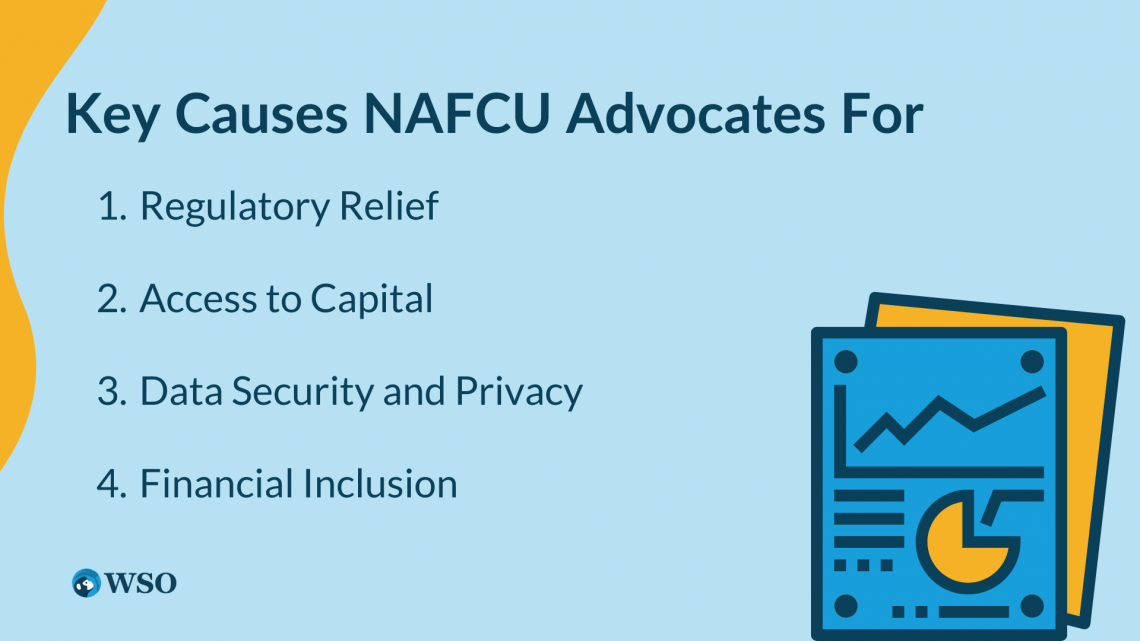National Association of Federally-Insured Credit Unions (NAFCU)
The National Group of Federally Insured Credit Unions (NAFCU) is a trade group for US credit unions with government assurances. It strongly advocates for its member credit unions before federal agencies, Congress, and the media.
What Is the National Association of Federally-Insured Credit Unions (NAFCU)?
The National Group of Federally Insured Credit Unions (NAFCU) is a trade group for US credit unions with government assurances. It strongly advocates for its member credit unions before federal agencies, Congress, and the media.

NAFCU’s mission is to promote credit union expansion, security, and stability by advocating for laws and regulations that benefit credit unions.
For the benefit of credit union professionals, it also provides various educational resources and networking events to help them stay educated, develop their skills, and manage the changing financial world.
Initially focused on representing federally chartered credit unions, NAFCU later expanded its scope to include federally insured state-chartered credit unions. This expansion marked a pivotal moment in the organization's history, recognizing the value of fostering cooperation and unity within the credit union sector.
The National Credit Union Administration Act's promulgation in 1970 was paramount to NAFCU. NCUA is a separate government organization responsible for regulating and supervising credit unions.

Establishing a regulatory framework to guarantee the sector's stability and soundness and a framework for credit union operations through this law marked a significant turning point in the organization's history.
The growth and expansion of NAFCU can be attributed to several factors. First and foremost is its dedication to advocating for credit unions on a national level. NAFCU recognized the importance of having a unified voice to represent the interests of credit unions in the face of evolving regulatory and legislative challenges.
Through its government affairs team, NAFCU actively engages with lawmakers, policymakers, and regulatory agencies to shape favorable policies and regulations for the credit union industry.
Key Takeaways
- NAFCU's strong representation at the federal level ensures that federally insured credit unions significantly influence sector-related laws and regulations.
- To encourage professional growth and improve credit union professionals' abilities, NAFCU conducts training programs, seminars, and workshops.
- By fostering a vibrant community and facilitating collaboration between credit unions, NAFCU promotes the exchange of ideas, experiences, and best practices.
- By interacting with lawmakers, regulators, and policymakers and actively participating in the regulatory process, NAFCU ensures that the voice of credit unions is heard.
- Credit unions of all sizes can benefit from the tools, advice, and support NAFCU offers, which enables them to expand and better serve the changing requirements of their members.
History Of The NAFCU
The history and evolution of NAFCU showcase its progressive development as a national trade organization dedicated to representing federally insured credit unions.

1. 1967: NAFCU's Founding
NAFCU was founded on August 8, 1967, in response to the demand for a national trade organization that could represent the interests of federally insured credit unions. The group aimed to give credit unions a single voice in discussions with the government and other financial organizations.
It helped mold laws and rules that impacted the credit union sector, such as the Federal Credit Union Act and the Credit Union Regulatory Improvements Act.
2. 1980s: Growth and Expansion
NAFCU's membership and influence significantly increased in the 1980s. To better serve the changing needs of credit unions, the association increased the scope of its services and resources, adding compliance support, research projects, and educational programs.
3. 1990s: Technological Advancements
NAFCU welcomed the opportunity that technology brought to credit unions as it started to transform the financial sector.
Note
To help credit unions adapt to the shifting environment, the association concentrated on training them about new technologies like internet banking, electronic money transfer, and mobile banking.
4. 2000s: Advocacy and Regulatory Support
NAFCU continued to be committed to advocacy and regulatory support in the 2000s. In discussions with Congress and regulatory bodies about topics including regulatory burden, capital requirements, and data security, the association vigorously supported the interests of credit unions.
NAFCU’s Duty: Advocacy For Credit Unions
Advocacy is one of NAFCU's primary duties. The association puts in a lot of effort to ensure that lawmakers, regulators, and decision-makers know what credit unions have to say.

The government affairs team monitors legislative and regulatory changes and works closely with legislators to promote supportive laws and regulations for the credit union sector. Key causes NAFCU advocates for include:
1. Regulatory Relief
It advocates for regulatory relief measures to alleviate the burden of excessive regulations on credit unions. The association works towards creating a regulatory environment that enables credit unions to serve their members while maintaining safety and soundness effectively.
2. Access to Capital
It supports regulations that improve credit unions' access to money, enabling them to offer their members reasonably priced loans and other financial services.
Note
Access to Capital includes supporting legislation to lift the member business lending cap and expand credit unions' ability to participate in Small Business Administration programs.
3. Data Security and Privacy
It actively engages in data security and privacy discussions to ensure that credit unions have the resources and tools to safeguard member information against identity theft and online dangers.
4. Financial Inclusion
It supports laws that support underserved groups' access to affordable financial services and financial inclusion. The association supports initiatives that enable credit unions to reach and serve unbanked and underbanked individuals and communities.
Note
Its advocacy activities have won important successes for the credit union sector.
The Credit Union Membership Access Act's passage, which widened credit unions' capacity to serve their communities by loosening membership limitations, is among notable accomplishments.
During the COVID-19 pandemic, it was also instrumental in getting credit unions included in the Paycheck Protection Programme (PPP), which enabled them to offer critical financial help to small businesses and their employees.
Education And Professional Development By NAFCU
NAFCU is dedicated to giving credit union professionals the information and tools they need to succeed in their positions.

The association offers various educational training events, webinars, books, and programs on subjects like borrowing, privacy and security, risk reduction, compliance issues, and leadership development.
1. Conferences and Events
It organizes several conferences and events throughout the year, bringing together credit union executives, industry experts, and thought leaders. These gatherings provide a platform for networking, sharing best practices, and discussing emerging trends and challenges.
2. Webinars and Online Learning
It offers webinars on various topics, providing credit union professionals convenient access to industry-leading experts and relevant content. These webinars cover regulatory updates, compliance issues, operational strategies, and emerging technologies.
3. Publications and Resources
It publishes various resources, including compliance guides, whitepapers, research reports, and newsletters, to inform credit unions about regulatory changes, industry trends, and best practices.
Note
Publications and resources serve as valuable references and tools for credit union professionals.
4. Leadership Development
It recognizes the importance of cultivating strong leaders within the credit union industry. The association offers leadership development programs and resources to help credit union professionals enhance their leadership skills and abilities.
Note
The courses include organizational management, team building, and strategy planning.
5. Certifications and Designations
It offers certifications and designations demonstrating a credit union professional's expertise and commitment to excellence. For example, the Certified Compliance Officer (NCCO) designation recognizes individuals with high knowledge and proficiency in credit union compliance.
6. Compliance Support
It acknowledges the significance of regulatory compliance for credit unions to preserve their members' trust and confidence while guaranteeing the security and soundness of their operations.
Note
It provides robust compliance support through various resources and services to assist credit unions in navigating the complex regulatory landscape.
7. Compliance Resources
It offers an extensive library of compliance resources, including regulatory alerts, model policies and procedures, compliance guides, and checklists. These papers cover a broad spectrum of legal subjects, such as consumer protection, finance, data security, and privacy.
8. Compliance Helpline
It provides a dedicated compliance helpline staffed by experienced compliance professionals well-versed in credit union regulations. Credit union professionals can contact the helpline for guidance and clarification on specific regulatory issues or challenges they may encounter.
The compliance helpline is a valuable resource, offering expert advice and practical solutions to credit unions needing compliance support.
NAFCU's Role In Advancing The Credit Union Movement
It plays a crucial role in advancing the credit union movement as a whole. The association actively engages with the public, media, and policymakers to raise awareness about credit unions' unique benefits and value propositions.

1. Public Awareness Campaigns
It promotes credit unions through public awareness campaigns that highlight the member-centric philosophy, community focus, and competitive offerings of credit unions.
These campaigns aim to attract new members and strengthen the public perception of credit unions as trusted financial institutions.
2. Collaboration and Networking
It fosters collaboration and networking among credit unions through various events, conferences, and online communities.
Note
By facilitating knowledge sharing, best practice exchanges, and cooperative initiatives, it encourages credit unions to learn from one another and collectively improve their operations and member services.
3. Industry Partnerships
It collaborates with other industry organizations, financial institutions, and service providers to enhance the collective strength and influence of the credit union movement.
These partnerships enable credit unions to leverage shared resources, access innovative solutions, and collectively advocate for common goals.
4. Research and Thought Leadership
It researches and publishes reports on various topics relevant to the credit union industry. These research findings and insights provide valuable information for credit union professionals, policymakers, and industry stakeholders.
NAFCU's thought leadership initiatives contribute to the knowledge base of the credit union movement and inform discussions on key issues affecting the industry.
Note
By driving research and thought leadership, it helps shape the future direction of the credit union movement.
5. Professional Development and Support
It invests in credit union professionals' professional development and support, ensuring they have the necessary tools and resources to thrive in their roles.
Offering educational programs, certifications, compliance support, and leadership development opportunities equips credit union professionals with the skills and knowledge to excel in their positions.
The association's multifaceted approach addresses the challenges and opportunities facing credit unions while promoting the unique benefits they provide to their members and communities.
The National Association of Federally Insured Credit Unions (NAFCU) FAQs

The National Group of Federally Insured Credit Unions (NAFCU) is a trade group for US credit unions with government assurances. It signifies credit unions before the federal government and offers various services and support to its member institutions.
Its principal objective is encouraging federally insured credit unions' growth, prosperity, and long-term viability. It strives to create a favorable legislative environment, support credit union-friendly legislative ideas, and provide opportunities for education and training for credit union professionals.
Federally insured credit unions in the United States are eligible to join NAFCU. Federal credit unions and state-chartered credit unions federally insured are welcome to join NAFCU.
It provides its member credit unions with a variety of services and tools. These include access to networking opportunities, publications on significant industry themes, compliance support, educational programs and training, industry research and data analysis, and advocacy and representation on legislative and regulatory problems.









or Want to Sign up with your social account?